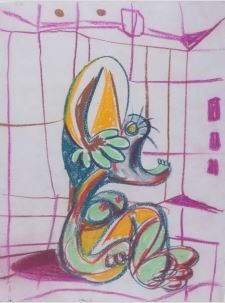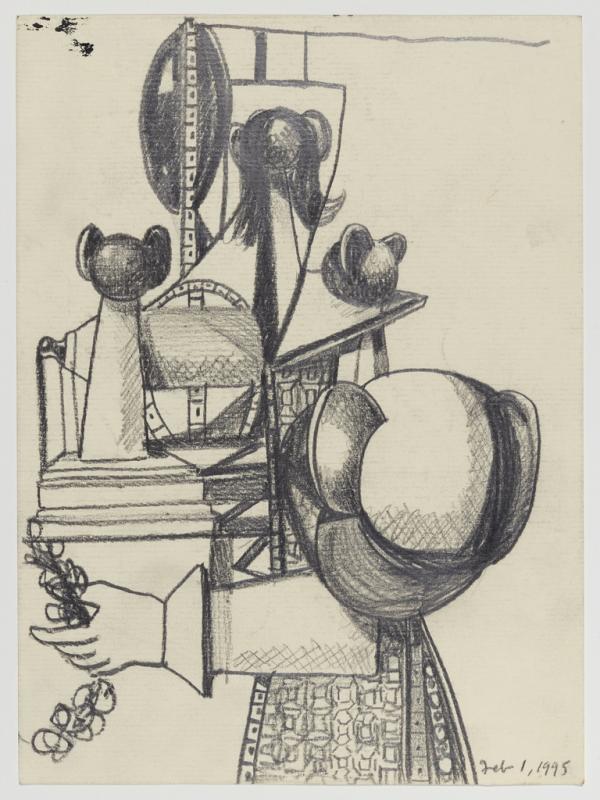“I kind of draw like you are walking through the forest,” Condo explains. “You don’t really know where you are going. You just start from some point and randomly travel through the paper until you get to a point where you finally reach your destination.” Such a spirit of improvisation has characterized Condo’s drawing practice from the beginning of his career. The earliest drawings among a group of twenty-eight sheets recently acquired by the Morgan date to 1975–76, when Condo was still a teenager. They already show him plundering art history to reimagine past styles—here Cubism and Surrealism—on his own terms. Their titles, Mind and Matter and Entrance to the Mind, signal the essential correlation between drawing and mental states that has remained central to his art until today.

George Condo
Back in Paris, 1989
Pastel on paper
Gift of Anna Nikolayevsky
2021.94
Born in 1957 in New Hampshire, Condo created a sensation on the New York art scene of the early 1980s with his old-master-inspired paintings that combine refinement and grotesque, virtuosity and exuberance. Together with artists such as Jean-Michel Basquiat and Keith Haring, Condo played a key role in reviving figurative painting in the American avant-garde, after two decades dominated by Minimalism and Conceptual art. Engaged in a continuous dialogue with earlier masters, from Rembrandt and Goya to Picasso and de Kooning, Condo uses traditional styles and techniques to create imaginary portraits in which wild distortions suggest extreme psychological states.
From the start, drawing has been central to his practice. The sheets acquired by the Morgan—thanks to the generosity of several donors—were selected with the artist’s collaboration to offer an overview of his career during the last forty-five years. Pastels of contorted figures from the second half of the 1980s, when Condo was living in Paris, mark the beginning of his lifelong fascination with Picasso. A 1994 delicately drawn hand study on colored paper offers an example of what Condo calls “fake old-master” or “simulated found object.” Condo’s revisiting of traditional subjects is particularly relevant to the Morgan where his works find echoes among drawings from past centuries. His Madonna and Child, for instance, is an irreverent update of a classical theme: a nude woman is seated in a wingchair located between two electrical outlets, holding a suspicious-looking character on her lap.
Fictional portraits dominate Condo’s production, forming a cast of characters in turn comic, monstrous, tragic, and endearing. In some works, diabolic entities peering from behind languorous female figures materialize their anxieties and nightmares. In others, mismatched eyes express a sense of panic or astonishment. “Everybody I draw is kind of lunatic,” Condo acknowledges. Among the regulars in his pictorial world are Jean-Louis the bow-tied butler and Rodrigo the waiter, who embody social stereotypes like characters in a play by Molière or Shakespeare. A French maid, a banker, and a businessman are some of the other stock figures called upon to enact the artist’s fantasies. In a few recent works, such as the spectacular Multifaceted Portrait of 2016, Condo has continued to explore what he calls “psychological Cubism,” in which the fractured image suggests multiple, conflicted emotions. “Picasso painted a violin from four different perspectives at one time. I do the same with psychological states,” Condo said. “It’s more about the way they feel than the way they look.”
Many drawings are related to paintings. In French Maid Studies, for instance, Condo worked out different options for suggesting light and shadow in the picture. Others are independent compositions. After completing the intricate Mechanical Man, the artist felt he had exhausted the subject on paper and did not make any painting of it. Going back and forth between drawing and painting, Condo does not establish any hierarchy between the two mediums. His brilliant draftsmanship is evident in his paintings on canvas just as his exquisite sense of color comes through in his use of pastel, watercolor, and colored pencil on paper.
In the Morgan collection, Condo’s work demonstrates the continuity of drawing throughout the centuries. His persistent mining and reinventing of the art of the past offer new perspectives from which to look at old master drawings.
All Images © George Condo, Courtesy the artist and Hauser & Wirth. Photography by George Condo Studio.
Isabelle Dervaux
Acquavella Curator and Department Head, Modern & Contemporary Drawings
The Morgan Library & Museum










